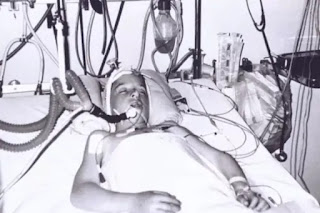Stephen McConomy
There are lots of
connections between the struggles in Ireland and Palestine. We share an
affinity for freedom and sovereignty. And in both places the British
Government has played a divisive and repressive role. The shaping of the
law to allow states to kill, imprison, torture, demonise, marginalise and
oppress a community have been part and parcel of our joint experiences over
many decades.
Senior British military
figures and at least one former RUC Chief Constable, Ken Newman, learned their
trade in part in the Middle East region.
The north was also a
laboratory for the British state. New and ever more sophisticated surveillance
technology, the gathering and holding of intelligence on citizens, the
recruitment of agents and informers, the use of collusion and the running by
British agencies of counter gangs were all a part of this. The case this week
of UVF agent Gary Haggarty is a case in point.
The deployment of rubber
and plastic bullets were a part of this also, along with CS and CR gas. In the
five years after their introduction in 1970 fifty six thousand rubber bullets
were fired in the north. They were then replaced by plastic bullets. In the
five years after that thirteen thousand of these were fired. In 1981, the year
of the hunger strike, almost thirty thousand plastic bullets were fired. 17
people, including 8 children were killed. Hundreds more were maimed for life.
One of those killed was
11 year old Stephen McConomy from Derry. Stephen died on April 19th 1982
three days after he was shot in the head by a plastic bullet fired by a member
of the British Army’s Royal Anglian Regiment. He was out playing with friends.
There was no trouble, no riots, no confrontation between local people and the
Brits. Residents who tried to go to Stephen’s aid were prevented from doing so
by the soldiers. He was eventually taken to Altnagelvin hospital in Derry and
then to the RVH in Belfast where he died.
One of the iconic images
of the years of conflict, taken by Chris McAuley then a journalist from An
Phoblacht, was of Stephen lying in the intensive care unit in the RVH. Efforts
by the British Army to prevent and arrest her were only stopped by the intervention
of Stephen’s father.
All of this came to mind
when I saw a photograph of 15 year old Mohammed Tamimi, a Palestinian youth,
who just before Christmas was shot at close range with a plastic bullet fired
by an Israeli soldier. The bullet that struck Mohammed entered his face under
his nose, broke his jaw and lodged in his skull. He was placed in an induced
coma and underwent a seven hour operation. In the Israeli version of the
plastic bullet the round is about the same size as a real bullet. It is metal
and coated with plastic. The damage it can do is characteristic of that used in
the north.
The similarity in the
photographs of two children lying in hospital beds hooked up to machines
fighting for their lives after being struck by these lethal weapons is a potent
reminder of the impact of state violence.
An hour after Mohammed
was shot, and only metres from that incident, his 16 year old cousin Ahed
Tamimi challenged Israeli forces who were on the family’s land. She slapped two
of the heavily armed soldiers. Ahed was subsequently arrested and is now in
Israeli custody awaiting a military trial. She has been refused bail and if
convicted faces between 10 and 14 years in an Israeli prison.
Ahed’s treatment has made her an international
figure of Palestinian resistance to Israeli occupation and aggression.
Demonstrations in support of her have been held around the world, including
here in Ireland. Amnesty International has called for her release and the UN
Office for the High Commissioner for Human Rights has criticised Israel.
I and others have raised
her situation in the Dáil with the Taoiseach. Ahed’s seventeenth birthday was
on Wednesday and there were many demonstrations held around the world to
coincide with this and demanding her release. Her military trial was also due
to begin the same day.
She is part of another generation of Palestinian
children who have grown up under occupation knowing nothing else but military
raids, house demolitions, the theft of land and water rights, arrests, and
aggression and hostility from an Israeli state that treats them as less than
second class. Israel’s apartheid system continues to cause great hardship
and poverty for the people of Palestine. The fabric of life for most
Palestinians is rooted in fear; it is arbitrary and constantly changing at the
whim of the Israeli authorities.
Since President Trump’s
announcement on December 6th that he recognises Jerusalem the
United Nations has reported that at least 345 Palestinian children have
been injured in clashes with Israeli forces. At least 17 Palestinians have been
killed.
I would urge anyone
concerned with the situation in the Middle East to join the protests in support
of Ahed. Ultimately however, if the Israeli government is to be moved, and if a
meaningful peace process is to begin, it will require the efforts of
governments and the international community. Very specifically, the Irish
government should implement the Oireachtas decision from 2014 to recognise the
state of Palestine and to upgrade the Palestinian Mission in Dublin to
that of a full Embassy.
For our part we who live
in Ireland are thankful that our children no longer die in conflict. No
matter who the perpetrator was the violent death of a child is a dreadful event
for parents. For families and communities. They will never forget what
happened. They should not be expected to. But In Ireland those days are now
history. That is not the case for Palestinian children. Let’s try to make it
so.
Mohammed Tamimi

.jpg)


Comments